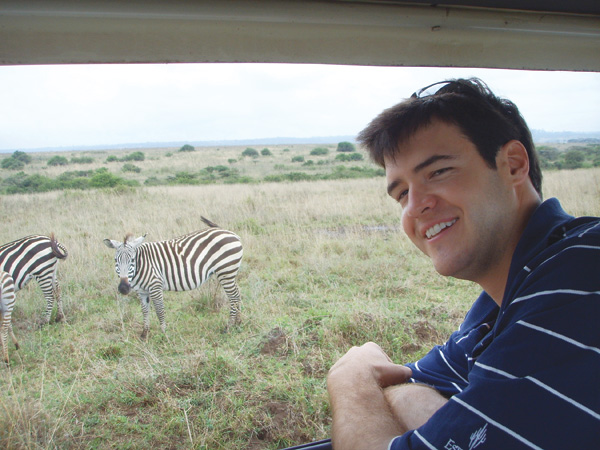
A few times a year, the second richest man in the U.S. invites students from business schools to meet and ask him anything. On February 22, Owen students traveled to Omaha, Neb., for a day with Warren Buffett. We enlisted second year MBA student Stephanie Dozier to give us a first-person account of the rare opportunity to meet the chair and CEO of Berkshire Hathaway. She and her fellow students also filled social media and blogs with information about their visit.
We almost didn’t make it. The week of our planned trip to meet with Warren Buffett, a major snowstorm went through the country. Omaha was expected to receive 12 inches of snow the evening we were to arrive, so everyone who could got excused from class on Thursday (the final day of Mod 3) and flew out early in the morning instead of late afternoon.
The group chosen for the trip consisted of 10 MBA students (five first years and five second years), three MAcc students, three MSF students, four EMBA students and our adviser, Phil Woodlief, adjunct professor of management. We each applied to be chosen, but the selection was random. I had applied because I knew it would be a once-in-a-lifetime opportunity to meet a brilliant man whom I tremendously respected. We had prepared for months in advance, reading The Essays of Warren Buffett (a compilation of letters to shareholders), discussing what we’d learned about him as an investor and a person, and carefully crafting and choosing questions for the Q&A session. Still, throughout all that, it seemed more like an exercise than preparation for something we would actually do.
 But there we were, on a Friday morning in snowy Omaha, rising early to visit the Nebraska Furniture Mart, a Berkshire Hathaway company. We toured the largest furniture store in the U.S. and listened to stories of how it was founded by Mrs. B, a Russian immigrant who could neither read nor write. And our tour guide? Mrs. B’s great-grandson, the head of real estate development for the company. This was an example of what we’d already learned—Buffett chooses great companies with great management, and continues to give that management free rein to succeed.
But there we were, on a Friday morning in snowy Omaha, rising early to visit the Nebraska Furniture Mart, a Berkshire Hathaway company. We toured the largest furniture store in the U.S. and listened to stories of how it was founded by Mrs. B, a Russian immigrant who could neither read nor write. And our tour guide? Mrs. B’s great-grandson, the head of real estate development for the company. This was an example of what we’d already learned—Buffett chooses great companies with great management, and continues to give that management free rein to succeed.
After our tour, we headed to Berkshire Hathaway Headquarters for the meeting with Buffett. We were there with six other business schools, including University of Pennsylvania–Wharton and University of Wisconsin–Madison. NYU’s Stern School of Business was supposed to join us, but the weather had led to their cancellation.
Buffett opened the room for questions, going alphabetically by school. The questions posed varied, with topics ranging from financial- and investment-related queries to advice for facing challenges, choosing good companies and prioritization, as well as his thoughts on social responsibility and emerging markets. One of our Owen group, MSF candidate Matthew Trautman, was excited to ask Buffett about his private jet—which Buffett has openly called both “indefensible and indispensable.” On that topic, Buffett said that “it’s about the only thing that costs money that makes my life better.”
It was great to hear his financial perspective from him, but the real value from the experience came in listening to his philosophy on life and career. Some of the key takeaways from the two-hour session with Buffett include:
- When dealing with a crisis or problem, “get it right, get it fast, get it out, get it over.”
- Stay within your circle of competence. The most important thing is not how big that circle is, but that you know where the perimeter is. “How do you beat Bobby Fisher? Play something other than chess.”
- Work for a company of people you admire. Write down the qualities of the people you admire most—these are habits, developed over time—and you can build them in yourself.
- Since we sit in the shade of trees others have planted, we should plant some ourselves if we have the means.
- Improving your ability to communicate makes you at least 50 percent more valuable.
 Time is the precious asset. Buffett doesn’t believe in determining how to live his life based on how other people expect him to live.
Time is the precious asset. Buffett doesn’t believe in determining how to live his life based on how other people expect him to live.- Think through what you want in life. The main things are interesting activities and great friends. You can’t make a mistake doing something you enjoy with your life. You’ll be a better person.
- Get out there and do it. Always move forward. Take some risks. “A lot of good things happen by accident.” If you do something you love, good things happen.
- On the most important job any of us will have: parenting. As parents, we have to be teachers and we don’t get a chance to hit the reset button. We should know that it isn’t what we say, it’s what we do. And never forget about the power of unconditional love.
After the Q&A, Buffett treated everyone to lunch at his favorite restaurant in Omaha, Piccolo Pete’s, where we finished off our meal with root beer floats. After lunch, Buffett took group photos with each of the schools, and we presented him with gifts we brought from Nashville—Goo Goo Clusters, an inscribed bottle of Jack Daniel’s, and an Owen Hatch Show print.

Our final stop in Omaha was Borsheim’s, a jewelry store and another of Berkshire Hathaway’s companies. Susan Jacques, president and CEO of Borsheim’s, met with us and discussed her history with the company and Buffett. Buffett has been open about his support of women in leadership, and even requires that all groups that visit him be at least 30 percent women. Knowing this, it was great to hear from one of the women managers that Buffett has supported. She had started with the company in the early 1980s, and told us about the shock she felt when Buffett told her he was promoting her to president in 1994. We had to leave directly from Borsheim’s to go to the airport and back to Nashville, but I was glad we’d had the time to fit in that tour as well.

In the end, the experience was exactly what I had expected from the Omaha trip: a rare, never-to-be-forgotten opportunity that I experienced by being at Owen.
Editor’s Note: Adjunct Professor of Management Phil Woodlief spent months applying for and orchestrating the visit, an offshoot of his Financial Statement Analysis Class. Woodclief says that 175 students applied for the 20 spots available on trip so attendees were chosen by lottery.

















